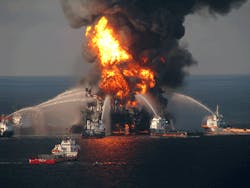BP Reaches $18.7 Billion Settlement for Federal, State and Local Deepwater Horizon Claims
Five years after the Deepwater Horizon explosion and spill in 2010, BP has reached agreements in principle to settle all federal and state claims arising from the event. BP tannounced July 2 that its U.S. upstream subsidiary, BP Exploration and Production Inc (BPXP) has executed the agreements with the federal government and five Gulf Coast states: Alabama, Florida, Louisiana, Mississippi and Texas.
The agreement with Alabama, Florida, Louisiana, Mississippi and Texas also includes settlement of claims made by more than 400 local government entities.
U.S. Attorney General Loretta E. Lynch commented that “after productive discussions with BP over the previous several weeks, we have reached an agreement in principle that would justly and comprehensively address outstanding federal and state claims, including Clean Water Act civil penalties and natural resource damages. BP is also resolving significant economic claims with the impacted state and local governments. We will work diligently during the next several months to incorporate the agreement in principle into a consent decree, which would then undergo public comment before court approval.”
If the court approves, the settlement “would be the largest settlement with a single entity in American history,” Lynch noted, adding that “it would help repair the damage done to the Gulf economy, fisheries, wetlands and wildlife; and it would bring lasting benefits to the Gulf region for generations to come.’
The principal payments are as follows:
- BPXP has 15 years to pay the United States a civil penalty of $5.5 billion under the Clean Water Act (CWA).
- BPXP will pay $7.1 billion to the United States and the five Gulf states over 15 years for natural resource damages (NRD). This is in addition to the $1 billion already committed for early restoration. BPXP also will set aside an additional amount of $232 million to be added to the NRD interest payment at the end of the payment period to cover any further natural resource damages that are unknown at the time of the agreement.
- A total of $4.9 billion will be paid over 18 years to settle economic and other claims made by the five Gulf Coast states.
- Up to $1 billion will be paid to resolve claims made by more than 400 local government entities.
“Five years ago we committed to restore the Gulf economy and environment and we have worked ever since to deliver on that promise,” said BP Chairman Carl-Henric Svanberg. “We have made significant progress, and with this agreement we provide a path to closure for BP and the gulf. It resolves the company’s largest remaining legal exposures, provides clarity on costs and creates certainty of payment for all parties involved. In deciding to follow this path, the Board has balanced the risks, timing and consequences associated with many years of litigation against its wish for the company to be able to set a clear course for the future.”
Bob Dudley, BP’s group chief executive, called the proposed settlement “a realistic outcome which provides clarity and certainty for all parties. For BP, this agreement will resolve the largest liabilities remaining from the tragic accident… For the United States and the Gulf in particular, this agreement will deliver a significant income stream over many years for further restoration of natural resources and for losses related to the spill.”
The agreements do not cover the remaining costs of the 2012 class action settlements with the Plaintiffs’ Steering Committee for economic and property damage and medical claims. They also do not cover claims by individuals and businesses that opted out of the 2012 settlements and/or whose claims were excluded from them. BP will continue to defend those claims.
“Since the Deepwater Horizon oil spill – the largest environmental disaster in our nation’s history – the Justice Department has been fully committed to holding BP accountable, to achieving justice for the American people and to restoring the environment and the economy of the Gulf region at the expense of those responsible and not the American taxpayer,” said Lynch. “In December 2010, my predecessor, Attorney General Eric Holder, announced a civil lawsuit against BP and its co-defendants. Since that time, the Deepwater trial team has fought aggressively in federal court for an outcome that would achieve this mission, proving along the way that BP’s gross negligence resulted in the Deepwater disaster.”
About the Author

Sandy Smith
Sandy Smith is the former content director of EHS Today, and is currently the EHSQ content & community lead at Intelex Technologies Inc. She has written about occupational safety and health and environmental issues since 1990.
